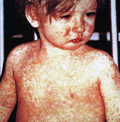 In the face of a serious measles problem, European health authorities have pledged to abandon ‘business-as-usual’ approaches in favour of more radical strategies to push back against the disease.
In the face of a serious measles problem, European health authorities have pledged to abandon ‘business-as-usual’ approaches in favour of more radical strategies to push back against the disease.
Around 100 leading experts gathered in Dublin, Ireland, this month for a meeting hosted by the European Centre for Disease Prevention and Control (ECDC) to address new tactics for increasing immunisation rates, particularly among communities where vaccine uptake is low.
The number of measles cases in Europe has quadrupled since 2008 and several countries experienced large outbreaks in 2010 and 2011, according to the ECDC which says that around 30,000 children were infected with measles last year.
There have also been outbreaks of rubella in Romania and Poland this year which has led experts to voice concern over the potential for a rise in birth defects caused by congenital rubella syndrome (CRS).
Efforts to wipe out measles and rubella in Europe by 2015 are already jeopardy. Both diseases can be prevented by the MMR vaccine but vaccination coverage must reach 95% or measles will continue to spread.
10-point plan to defeat measles
After detailed discussion with experts from a wide range of fields including specialists in how diseases spread as well as communication professionals, the meeting signed off on a 10-point plan to reinvent Europe’s strategy against measles.
- Invest in education for doctors and nurses to communicate more efficiently and emphatically to their patients;
- Make remembering easier, e.g. by strengthening efficient alert and reminder systems to remind people about vaccination;
- Include measles under broader concern about children’s health and support the mother’s role as key opinion leaders on health issues in their families;
- Address stigma and discrimination;
- Cooperate with field workers;
- Make vaccination more accessible, for example, offer immunization days/campaigns in different locations, where people work and live;
- Motivate local authorities and non-governmental organisations to cooperate on community-based interventions, particularly targeted to underserved groups;
- Conduct thorough epidemiological analyses of the groups at risk for lower vaccination uptake;
- Use mass media, e.g. insert measles-related messages in television soap operas, encourage wider collaboration between public health and film, TV industry;
- Monitor the web to understand concerns on vaccination and provide answers based on trusted web sources.
Many of the strategies can be applied more generally to raising immunisation rates against other illnesses. The European Commission is hosting a conference on childhood immunisation later this month. Vaccines Today will have a detailed report after the event.
Read a press release from the ECDC here or click here for a more detailed report
Watch: Measles – Battling Complacency in Europe




